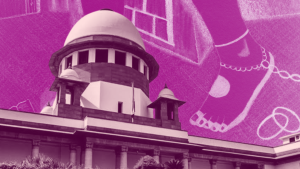Why Surrogates Are Still Passive Deliverers Of Service, With Few Rights

India’s new laws on surrogacy, meant to prevent exploitative practices, still do not fully recognise the surrogate’s rights to full economic, medical, legal, and physical protection, says legal scholars and gender activists. This lack of reproductive justice also extends to discriminatory rules on who deserves to be a parent through surrogacy.
The two laws passed in December 2021 – the Surrogacy (Regulation) Act, 2021, and the Assisted Reproductive Technology (Regulation) Act, 2021 – have been in the making for nearly 13 years.
Surrogacy is an assisted reproductive method where the embryo is implanted into the reproductive system of a third person, and its framework has been debated across the world (here and here) on ethical, legal and medical grounds and is currently allowed in only 10 countries including India.
The fundamental criticism against surrogacy is that it tends to be exploitative and violative of human rights because it commodifies women’s bodies – most surrogates come from poor and marginalised homes and have little bargaining power. However, it is also argued that if it is regulated and surrogates get the rights they are entitled to, surrogacy can be treated as a form of labour that can transform traditional and patriarchal notions of family.
“The possible reason for the complete ban is to avoid the exploitation of surrogates and egg donors in India like they did 10 years ago. But a complete ban is untenable, not on the grounds of right to livelihood, but on the grounds that it would lead to unregulated, illegal markets,” said Prabha Kotiswaran, professor of law and social justice at King’s College, London.
India chose to neither ban surrogacy nor open it completely under its new laws, and instead declared that it must be an entirely non-commercial practice with only payments for basic medical and other prescribed expenses to the surrogate. It also requires a 36-month insurance coverage, including for postpartum complications. The surrogate also must be informed of all the side-effects and after-effects of the procedure and her written consent be taken only after she makes an informed decision.
The laws also lay down conditions on who gets to be parents through surrogacy, excluding same-sex couples and other members of the LGBTQI+ community, single men, single women who are neither widowed nor divorced or are widowed and/or divorced but are under 35 or over 45 years of age, couples suffering from secondary infertility or outside a certain age bracket.
These exclusions and restrictions are being currently challenged in petitions before the Supreme Court on the grounds that they are violative of fundamental rights under the Constitution and impose a state-sanctioned family planning and reproduction model.
“The two laws, though well intended, limit the scope of the Acts to married heterosexual couples and a small category of women — divorced or widowed, which are further qualified by age brackets. Such a limited scope of application excludes a large category of persons from accessing parenthood and thus strikes at the fundamental rights of these persons,” said Rohin Bhatt, a lawyer and a queer and human rights activist.
Early Years
Surrogacy was legalised in India in 2002 as part of the government drive to push medical tourism. It soon became a booming business, creating surrogacy hubs in places such as the one in Anand in Gujarat where, as this investigative report in Mother Jones points out, profiteering clinics charged intending couples anywhere between $15,000 and $20,000 while paying surrogates a pittance and boarding them in cramped dormitories. There were also reports of opaque, unethical and unsafe medical practices, sometimes leading to the death of surrogate mothers.
The industry was completely unregulated till 2005 when the National Guidelines for Accreditation, Supervision and Regulation of ART Clinics were issued by the Indian Council of Medical Research (ICMR) and National Academy of Medical Sciences (NAMS). Under these, anyone could qualify as an intending parent based on their marital status, sexuality, or nationality. But the conditions were not legally binding.
The first attempt at legislating surrogacy was made in 2008 but the Bill was never passed in Parliament. The Law Commission suo moto took up research on issues related to assisted reproductive technology and surrogacy and presented its findings In its 228th report in 2009.
Four bills were introduced in 2008, 2010, 2014, and 2016 before the final one was introduced in 2019. With each new bill, the law’s scope became increasingly narrow. The 2014 bill was the first step towards a restrictive regime, allowing only married heterosexual couples to opt for surrogacy. The bill also sought to restrict foreign couples from commissioning Indian surrogates.
In 2015 the Ministry of Home Affairs completely restricted surrogacy by foreign couples after the apex court suggested the same based on a public interest litigation. In 2016, the Surrogacy (Regulation) Bill was introduced, for the first time proposing a complete ban on commercial surrogacy and allowing altruistic procedures, but only for heterosexual, married Indian couples.
This bill was then presented to a Standing Committee of the Parliament, which after hearing the testimonies of surrogates, suggested that commercial surrogacy be legalised, live-in couples allowed to access surrogacy service, and no conditions be placed on the sexual orientation of intended parents. These suggestions were rejected.
The bill was passed by the Lok Sabha but lapsed in the Rajya Sabha, and was subsequently reintroduced in Parliament in 2019. The laws were finally passed in December 2021: the Surrogacy (Regulation) Act, 2021, and the Assisted Reproductive Technology (Regulation) Act, 2021 along with their ancillary rules- the Surrogacy (Regulation) Rules, 2022, and the ART (Regulation) Rules, 2022 respectively.
The Big Change – Altruism
The latest Surrogacy Act only allows altruistic surrogacy, as we said earlier. But does this empower surrogates? No, says Kotiswaran, pointing to its lack of a reproductive justice framework – the surrogate is still not seen as a rights-bearing citizen but only as the carrier of a foetus.
“Even if only altruistic surrogacy is allowed, the current laws fail to recognise the rights of the surrogate and do not perceive her as someone whose rights must be protected. The law missed out on protecting more than postpartum complications, like depression or mental health issues, lost time with her family, lost wages during and post pregnancy, the impact of inconvenience caused due to hormone treatments, etc. The current law does not create a robust protection scheme for what is given up by the surrogate,” she said.
She also argued that the full set of rights of the surrogates must include compensating for their labour.
The 2016 parliamentary Standing Committee suggested that limiting surrogacy only to women related to the intended parents is unworkable because it does not factor in the complexities of Indian families wherein women have little or no decision-making autonomy and may be coerced into providing reproductive labour.
It has been argued that commercial surrogacy neglects the wellbeing of the surrogate by not informing her of the details of embryo insemination, not giving her the choice to see the baby or knowing the intended parents and having no access to counselling. But altruistic practice may not be the answer to the problem, argued Nishtha Lamba, a behavioural scientist specialising in psychological health and social policy, because the chances of surrogate mother forming an emotional bond with the baby are higher.
As per Lamba, research also showed that some form of compensation helps instil in the surrogate some detachment from the baby, said Lamba.
Why The Laws Are Exclusionary
Most petitions against the surrogacy law focus on its exclusionary clauses – where certain categories of persons cannot seek a child through surrogacy. These are:
(a) Same-sex couples and other members of the LGBTQ+ community,
(b) Single women who are neither widowed nor divorced,
(c) Single women who are widowed and/or divorced and less than the age of 35 or more than 45,
(d) Single men,
(e) Couples suffering from secondary infertility,
(f) Couples where either partner does not fall within the defined age brackets
(g) Couples where both partners are outside the defined age bracket.
The two laws were first challenged before the Delhi High Court in May 2022 by Karan Balraj Mehta, an advocate along with a psychology teacher who wishes to have a second child through surrogacy.
“As a single man, the existing legal regime does not allow me to access surrogate services. Similarly, my co-petitioner faced complications in her first pregnancy and thus wishes to have a second child through surrogacy, but the law restricts married couples who are already with a child from accessing surrogacy. We challenged the laws as it arbitrarily excludes us from its scope and thus creates a restrictive reproductive regime in our country,” said Mehta.
While Mehta’s petition is listed to be heard by the Delhi HC in November and a notice to the government has been issued by the court seeking their response, another petition challenging the two laws was recently filed before the Supreme Court. Arun Muthuvel an IVF specialist from Chennai has filed a petition before the apex court challenging the various provisions of the two laws on several grounds – its arbitrary and discriminatory classifications, age restrictions, inconsistencies, infringement of privacy and onerous requirements.
Discriminating Over Sexuality, Age and Matrimony
While the courts have already recognised queer relationships and the rights of queer persons, the limited scope of the surrogacy act hinders the full exercise of their reproductive rights, said lawyer Rohin Bhatt.
“The apex court in several judgements has recognised rights of queer persons. The right to procreate and reproduce has also been held to be a facet of the right to privacy by the Supreme Court. Recently the Supreme Court emphasised the need for the law and the courts to recognise atypical manifestations of family, and it is time the legislature does that too,” said Bhatt.
The ART Act limits its application to married couples by mandating that the woman be between the ages of 21 years and 50 years, and the man between the ages of 21 years and 55 years.
Also, under Sec. 4(iii)(c)(I) the Surrogacy Act, age brackets have been specified for couples – 23-50 years for the woman and 26-55 years for her male partner. This Act also enables divorced and widowed women to avail surrogacy but she must be between the ages of 35-45 years, according to Sec. 2(s).
“The classification as per age is also arbitrary and exclusionary as the medical conditions necessitating ART or surrogacy may exist even before or after the set age limits,” said Mohini Priya, an advocate on record at the Supreme Court.
The apex court in a 2008 judgement held that intending parents may include single males, or women who are fertile but do not wish to undergo the pregnancy. Even the 2008 Bill for ART regulation, drafted by ICMR, provided for single parenthood through surrogacy.
“The Acts make a distinction based on marital status by limiting the application only to married childless couples and divorced or widowed women, leaving out unmarried single women and single men,” said Mehta.
Inconsistencies, Denial Of Privacy
There are two inconsistencies between the two Acts related to ART and within the provisions of the Surrogacy Act itself. First, the minimum age for the intending couple under the Surrogacy Act is 21 years for the man and 18 for his female partner. But, under Sec. 4(iii)(c)(I) which provides for compliance provisions, an age bracket is specified – 26-55 years for the man, and 23-50 years for the female partner. This leaves a large gap in the ages set as conditions for surrogacy.
Secondly, in the Surrogacy Act the definition of ‘surrogate mother’ is a woman who agrees to be a surrogate through implantation of the embryo in her womb and bear a child for the couple. But she must be genetically related to the intending couple or intending woman. But the definition of ‘gestational surrogacy’ under the explanation to Sec. 4(ii)(a) requires the woman carrying the child to not be genetically related to her. “It is practically impossible to find a surrogate mother genetically related to the intended couple but not to the child,” said advocate Mohini Priya.
The condition of a surrogate mother being genetically related to the intending couple also infringes the right to privacy under Article 21 of the Constitution, say legal experts and activists. “In a country where infertility or the inability to conceive is still a taboo, the intending couple may find it hard to share information with their family members on finding a genetically related surrogate mother,” said Ameyavikram Thanvi, an advocate in the Supreme Court.
Additionally, the law seeks a certificate from the District Medical Board confirming the eligibility of the commissioning couple, and this means putting personal information, especially relating to fertility, in the public domain.
The ‘Livelihood’ Argument
Writing for the 2020 anthology, South of the Future: Marketing Care and Speculating Life in South Asia and the Americas, Sital Kalantry, professor of law and expert on human rights, pointed out how the provisions of the then bill (now the law) reflect traditional notions of family and excludes certain groups from parenthood. This limits the scope of the transformative effect that surrogacy can have on the concept of family.
In Kalantry’s study, surrogates speak of how they wish to have the right to sell gestational care. This allows them to earn and help others start a family, they said. The women also said they saw nothing wrong with the practice but also sought government regulation of the industry to prevent physical and financial exploitation. They also demanded a guarantee of gestational and postpartum care.
But Dalit and other feminist scholars have argued that linking surrogacy to livelihood issues perpetuates the exploitation of surrogates who are usually from marginalised communities and poor homes (here and here). They have pointed out that women are mostly pushed into becoming surrogates – and also stigmatised for it – because of their social position and economic desperation. In most cases, they are unaware of their rights and the liabilities that they incur by signing the various documents related to surrogacy.
The 2010 investigative report from Anand said that contracts signed by the surrogates were vague and offered no clarity on benefits or compensation. In cases of miscarriage, they would only be paid partially.
The work of offering a womb for hire has also been compared to sex work in this essay in The Economic & Political Weekly. Scholars speak of a parallel between the two in “not only how social locations shape women’s ‘choice’ of becoming surrogate mothers, but also the conditions in which they find themselves once within the industry”.
The essay also pointed to the denial of dignity to surrogates and their social vulnerability. “While economic desperation and social marginalisation is a recurrent reason for entering into sex work and surrogacy, this counteracts the equally important struggle for dignity, as both sex work and surrogacy are stigmatised occupations in the Indian context,” it said.
What Needs To Be Done
Practices such as surrogacy must be made within a reproductive justice framework that accounts for social, political and economic inequalities among different communities, say legal scholars such as Alison Bailey in Reconceiving Surrogacy: Toward a Reproductive Justice Account of Indian Surrogacy, and Sharmila Rudrappa in Discounted Life: The Price of Global Surrogacy in India. The legislation and policy frameworks on ARTs and surrogacy must also ameliorate exploitation and domination, they say.
Any commercial transaction can be exploitative if the bargaining power rests with those who decide on how much compensation is to be offered, said Kotiswaran. “In surrogacy services, due to the several marginalisations of the women, their rights become secondary and subordinate to that of the intended parents and the other actors. They are subjected to precarious conditions, and have no decision-making power in the process and even in how the delivery of the baby is to be done,” she said.
A reproductive justice framework would ensure that the surrogate is given decisional autonomy, her rights are recognised and the legal documents she signs are made available in a language she understands. This means that the woman is provided with a full set of economic, medical, legal, and physical protection and rights, said Kotiswaran.
We believe everyone deserves equal access to accurate news. Support from our readers enables us to keep our journalism open and free for everyone, all over the world.




